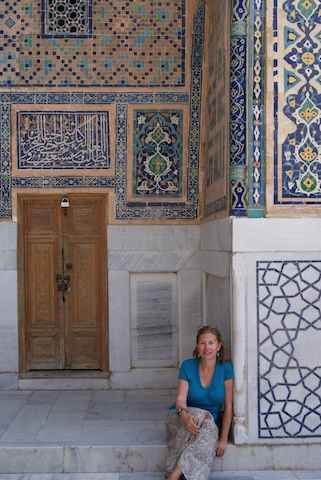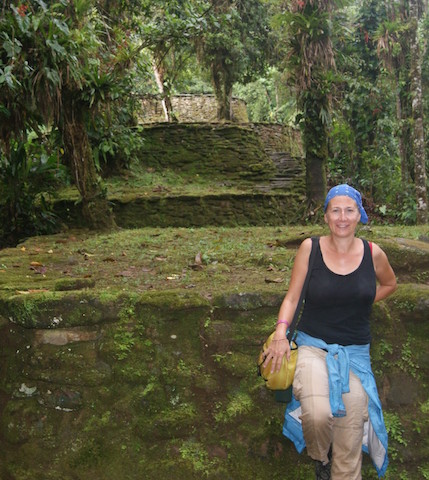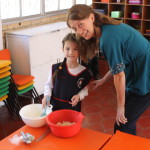Knowing When to Go and When to Come Home

In Karakol’s animal market, I pulled a new friend away from an extremely unhappy bull, whose halter was held tightly by a young handler while prospective buyers circled and commented. We took refuge behind a huddle of fat-bottomed sheep, tied to the bumper of a Russian truck. Four men in conical felt hats lolled against the front of the truck, smoking and idly watching a Kyrgyz race horse try to throw its rider.
I’d left Canada nine months before, but scenes like this still reminded me how far I was from home. Kyrgyzstan was the fifteenth country in which I’d spent time during what I later came to refer to as my “big trip.” By the time I decided to buy a return ticket to Vancouver, I’d explored twenty-two countries, travelled approximately 85,000 kilometres, and had been on the road for thirteen months.
Many people assume I went through a bad break-up or received a health scare.
Many people assume I went through a bad break-up or received a health scare, because why else would a forty-three year old woman with a successful career and condo by the beach stuff her life into a backpack and leave her known world behind?
I wish I could say I left because I needed to process some life event or because of some noble idea to help people in gang-controlled El Salvador. But the truth is, I was restless. I needed to do something different, to test myself, to shake things up.
So, in 2011, I sold my condo and car, disposed of most of my possessions, and left my job. When I bought my one-way ticket to Central America, it was with no real sense of when I would come back, or even if I would come back.
Many people assume I went through a bad break-up or received a health scare, because why else would a forty-three year old woman with a successful career and condo by the beach stuff her life into a backpack and leave her known world behind?
I choose to go to El Salvador because of the Centro de Intercambio y Solidaridad, an organization committed to social justice. Even though volunteering with the CIS wasn’t my primary reason for leaving home, I’m a passionate human rights advocate, and believed this organization was actually making a difference in people’s lives.
I needed this trip to be about more than just me exploring the world, and so I signed on for a three-month stint as an elections observer and English teacher. Since my Spanish wasn’t the best, I first spent a month in Honduras, living with a local family and receiving one-on-one language tutoring.

My time in El Salvador was stressful, educational, and rewarding, and as it drew to a close, I knew I wasn’t ready to return to Canada. In fact, I’d enjoyed the experience so much, I sought out another volunteer opportunity. I didn’t care where or even what, so long as the organization in question worked with people on the ground and truly cared about helping.
So as I visited friends in Nicaragua and travelled through Colombia, making inquiries as I went. These led to the chance to teach writing and English for three months in Myanmar, living for free at one of Mandalay’s largest monasteries.
Since that placement wouldn’t begin for another few months, I continued travelling…
Since that placement wouldn’t begin for another few months, I continued travelling, leaving Latin America for the Mediterranean and Central Asia, making my way towards Thailand, where I would apply for my Myanmar visa.
Although I visited some amazing places and met some wonderful people, I experienced moments of intense loneliness and homesickness. I hadn’t expected to miss Canada so much. And despite my new friends on the road, I yearned for those who knew me well. I also began to appreciate how privileged women in Canada are. Yet I didn’t think seriously about returning home until the day I discovered my mum had cancer.
Who wants to go into an office every morning after wandering tropical beaches and exploring ruins of former civilizations for more than a year?
It had been caught at an early stage, so there was no need to rush back, but this incident made me realize that, at least for now, I belonged in Canada. It wasn’t possible to Skype or make international phone calls from where I was in Myanmar, but after completing my term there, I flew to Jakarta, connected with my former boss, and told her I was thinking of returning.
I was lucky, because even though my old job had been taken over by someone else, she agreed to find a place for me. We discussed dates, and I booked a flight home. But before that, I spent seven more weeks on the road, exploring Indonesia and the Philippines.
Knowing When to Go and When to Come Home
Returning wasn’t easy. Who wants to go into an office every morning after wandering tropical beaches and exploring ruins of former civilizations for more than a year? Uneasy with the commercialism of North American society, I experienced culture shock even when just entering a grocery store. I had trouble relating to my friends and colleagues.
I appreciated the small things, though—drinking water from the tap, sleeping in one bed for longer than a few nights, knowing I’d be understood when I spoke. These simple pleasures helped me reintegrate to life in Canada.
A bedridden woman once urged me to travel while I can, so that if I ended up like her, at least I’d have my memories. I like to believe that she played a part in my decision to take my “big trip,” and that I’d do it again when the timing’s right.

Photos credits for Knowing When to Go and When to Come Home by Claire Morris and Unsplash. This article was originally published on April 5, 2015 on Pink Pangea.









After many millennials’ packed-and-left stories, this one warmed my heart to read. Knowing when to go and when to come home is a sign of wisdom, a life lived fully. I appreciate the honesty of your writing, Claire!